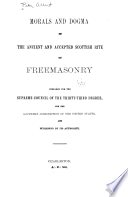
Source: Morals and Dogma of the Ancient and Accepted Scottish Rite of Freemasonry (1871), Ch. XIX : Grand Pontiff, p. 316
Context: If not for slander and persecution, the Mason who would benefit his race must look for apathy and cold indifference in those whose good he seeks, in those who ought to seek the good of others. Except when the sluggish depths of the Human Mind are hroken up and tossed as with a storm, when at the appointed time a great Reformer comes, and a new Faith springs up and grows with supernatural energy, the progress of Truth is slower than the growth of oaks; and he who plants need not expect to gather. The Redeemer, at His death, had twelve disciples, and one betrayed and one deserted and denied Him. It is enough for us to know that the fruit will come in its due season. When, or who shall gather it, it does not in the least concern us to know. It is our business to plant the seed. It is God's right to give the fruit to whom He pleases; and if not to us, then is our action by so much the more noble.
